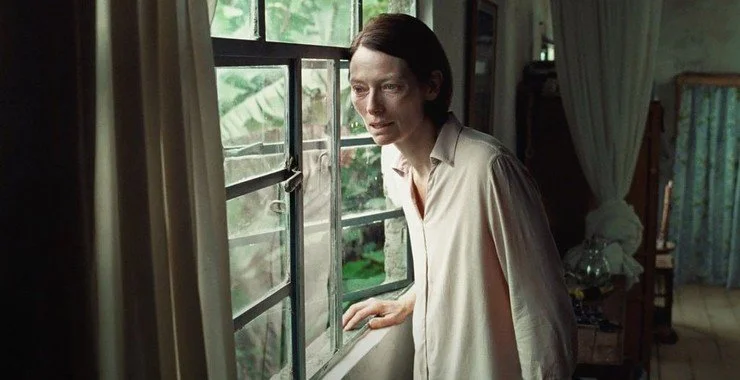Film review: Mystifying Memoria casts a strange spell
Apichatpong Weerasethakul’s latest cinematic odyssey heightens sound to create a waking dream
VIFF screens Memoria at the Vancity Theatre until June 8
THAI AUTEUR Apichatpong Weerasethakul opens his new film with a bang—but not at all in the way you might expect, unless you’re familiar with his unique, hypnotic brand of slow cinema.
In the half-light just before the sun rises, we can barely make out the body of a person sleeping. And then, after long, still minutes, a boom awakens her—literally and figuratively—propelling Tilda Swinton’s Jessica into a mysterious existential odyssey.
Memoria, screening only in cinemas, works a spell, but it is best enjoyed if you don’t try too hard to unravel its secrets; instead, submit to its dream logic, and you might be swept away by its somnolent poetry.
When Medellín-based Jessica first hears the bang, she’s in Bogotá, visiting her ill sister Karen (Agnes Brekke). In Weerasethakul’s first film shot outside of Thailand, Swinton plays a stranger in a strange land—a British flower dealer working in Colombia. Weerasethakul uses the setting to atmospheric effect, through heightened imagery and sound, contrasting the constructed, concrete urban world of the film’s first half with the lush rural setting of Amazonía in the second.
Jessica hears the concussive noise again and again, when no one else can, and embarks on an odd quest to unlock its meaning. In one extended sequence with a Bogotá sound engineer named Hernán (Juan Pablo Urrego), she tries to re-create the bang she describes as “a ball of concrete hitting a metal wall surrounded by seawater” and “a rumble from the core of the Earth”. In others, she spends time with an archeologist studying 6,000-year-old human remains found in the excavation of a huge tunnel.
Things turn stranger still when she journeys beyond the city to a misty jungle village, where she hears the sound more prominently—at one point, bending her gawky frame over sideways to get her ear closer to the Earth to hear it. There, she forms a deep connection with an older fisherman, also named Hernán (Elkin Díaz); he’s never left this small place, or its simple existence. When Jessica visits his home, she starts to absorb more sounds—and more memories that are not her own. In the film’s most haunting sequence, she sits silently watching him fall asleep, but it looks unsettlingly like death.
Through it all, the quietly enigmatic Swinton is our perfect guide—an outsider navigating the mysteries of the past and the present, life and death, the natural and the supernatural.
What does it all mean? For some viewers, the lack of answers will be frustrating. But there is so much to mull over here—including subtle allusions to the political violence that’s wracked Colombia, to the destructive drive of development, and to lost civilizations.
With his beautifully impressionistic, waking dream of a film, the Buddhist Weerasethakul (Uncle Boonme Who Recalls His Past Lives) is asking you to listen closely to the whispers of not only our ancestors, but of the Earth—to the patter of a coming rainstorm, or the chorus of insects and birds.
Weerasethakul demands patience, but you have to admire his daring in sculpting a film that can only unfold on the big screen. After all, it could never work on laptop–when you have your own ambient sounds competing for attention.














